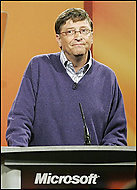Gates steps back, putting pressure on Ballmer, Ozzie
Bill Gates' decision to give up day-to-day duties at Microsoft Corp. puts more pressure on Steve Ballmer, Ray Ozzie and other executives to figure out the company's place in an industry increasingly focused on Internet-based services championed by Google Inc. and others.

A large chunk of that responsibility is likely to fall to Ozzie, who is well known in the technology industry but does not have anything close to the pop celebrity status of Gates, Microsoft's co-founder and chairman.
Gates said Thursday that he planned to step back from handling daily responsibilities by July 2008, although he will remain chairman. As part of the changeover, he immediately named Ozzie to take his place as chief software architect, the top technical job at the world's largest software company.
"Microsoft's biggest nightmare is people living in the browser," said Joe Wilcox, an analyst with Jupiter Research, reports AP.
At 50 years old, the same age as Gates, Ozzie's career has been characterized by the type of innovative ideas and foresight that Gates and Allen used to make Microsoft such a success in the first place. Ozzie's resume includes helping to invent VisiCalc, the first electronic spreadsheet, and serving as one of the masterminds behind Lotus Development's pioneering office software.
In the mid-80s, Ozzie led an initiative to create the groundbreaking Lotus Notes, one of the first applications that allowed teams to work on shared documents and communicate electronically. (In 1995, IBM (IBM : 77.87 , -0.69 , -0.9% ) bought Lotus for $3.5 billion, largely because it wanted ownership of Lotus Notes.) Then in 1997, Ozzie founded Groove Networks, which invented even more advanced collaboration software that allowed for ad hoc groups to work virtually with one another.
"He's a programmer's programmer," says Rob Enderle, a Silicon Valley technology analyst. "He doesn't have the management skills that Bill has, but he probably doesn't need them. And he's probably a stronger programmer than Bill ever was."
Gates has had his eye on Ozzie for years now. In April 2005, Gates even went so far as to buy Ozzie's Groove Networks for an undisclosed sum in order to get him onboard. After the sale was complete, Ozzie was immediately dubbed chief technology officer, one of the highest ranks at the company. Since then, Gates has been slowly stepping out of the spotlight, making room for Ozzie, whose leadership role with developers has started to gain momentum.
Perhaps the hardest thing Ozzie will have to overcome will be enduring the psychological impact of Gates's departure. "Bill is such a larger-than-life individual. When you have a larger-than-life individual like Bill Gates, Scott McNealy, Steve Jobs or Larry Ellison, it will have a bigger impact than if it was just a regular employee," says Enderle, the technology analyst. "They are viewed as much a part of the company as the company is. It's hard to replace those larger-than-life folks."
Ozzie may not ever command the hero worship that Gates enjoyed from his legions, but he could at least resurrect the innovative spirit that Gates brought to the company in the first place. If not, Microsoft 2.0 could prove to be riddled with flaws, reports Smartmoney.
O.Ch.
Subscribe to Pravda.Ru Telegram channel, Facebook, RSS!

